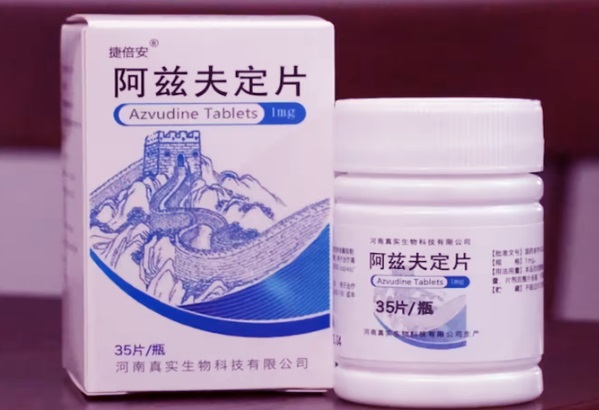Nikhil Prasad Fact checked by:Thailand Medical News Team Apr 10, 2025 2 days, 18 hours, 20 minutes ago
Medical News: A major new study out of China has uncovered promising results for a lesser-known antiviral drug called azvudine, particularly for patients with COVID-19 who also suffer from kidney disease—a group that’s often more vulnerable and has fewer treatment options. The research was conducted by a large team from multiple institutions across Henan Province, including the State Key Laboratory of Antiviral Drugs and Pingyuan Laboratory at the First Affiliated Hospital of Zhengzhou University, Henan Provincial Chest Hospital, and eight other leading regional hospitals.
 Azvudine Significantly Cuts COVID-19 Death Risk in Kidney Patients
Azvudine Significantly Cuts COVID-19 Death Risk in Kidney Patients
The study, a multicenter retrospective cohort involving over 32,000 hospitalized COVID-19 patients, is the first to examine whether azvudine can reduce death rates in those with kidney complications. After careful patient matching and statistical adjustments, researchers focused on two equally sized groups of 831 kidney patients each—one treated with azvudine and one that received standard care without antivirals. This
Medical News report highlights that the results show a significant reduction in both all-cause death and disease progression in those who received the drug.
Azvudine Shows Life Saving Potential for Kidney Patients with COVID-19
Azvudine, developed in China as an oral antiviral, has previously been approved for general COVID-19 use but had not been specifically tested in patients with underlying kidney disease. This group is particularly high-risk—past studies have shown they are more likely to suffer complications, require ventilators, or die from COVID-19.
In this new analysis, those who took azvudine had a 38% lower risk of death (hazard ratio or HR of 0.62) compared to those who received no antiviral treatment. The risk of disease worsening—defined as death or progression to severe or critical illness—was also lower by 21% (HR 0.79). These findings were consistent across age groups, disease severity levels, and other conditions like diabetes or heart problems.
Even more impressively, the study underwent five separate sensitivity analyses to confirm the results, including adjusting for patients discharged too early or those possibly unable to take the drug properly. In each case, the life-saving effect of azvudine held steady.
Safety Profile Shows Few Serious Concerns
Safety was another focus of the research. While the azvudine group did show slightly higher rates of mild side effects like elevated liver enzymes or drops in lymphocyte count, severe side effects were rare and manageable. Interestingly, the drug even appeared to reduce levels of creatinine—a key marker of kidney strain—and uric acid, suggesting it might improve kidney function in some patients rather than worsen it.
Moreover, compared to other popular antivirals such as nirmatrelvir/ritonavir (Paxlovid), azvudine has a lower overall adverse event rate, making it potentially a safer and more suitable option for patien
ts already dealing with compromised kidney health.
Unique Kidney Protective Effects Could Widen Azvudine’s Use
What makes azvudine particularly intriguing is its possible kidney-protective properties. The study noted reductions in harmful markers like creatinine and cystatin C in patients taking the drug, and no decline in glomerular filtration rate, which measures kidney performance. These findings suggest azvudine may help the kidneys recover, potentially reducing the need for dialysis or long-term complications.
Researchers propose that this effect could stem from azvudine’s strong antiviral properties. By halting viral replication, the drug reduces the direct damage COVID-19 can cause to kidney tissues. Moreover, by suppressing the immune system’s overreaction—lowering inflammation levels—azvudine may protect against the kind of prolonged kidney injury often seen in serious infections.
Real World Impact and Future Possibilities
This large, real-world study carries significant implications for clinical practice. With COVID-19 still causing waves of infections, especially in vulnerable populations like those with kidney disease, the need for tailored treatments remains urgent. Azvudine could offer a much-needed therapeutic tool, especially in countries where access to other drugs is limited or where kidney-safe options are in short supply.
The researchers also stress that this study's strength lies in its robust methodology. Unlike earlier trials, it accounted for over 20 different patient factors, including lab test results, comorbidities, medication use, and timing of treatment. The consistent findings across multiple statistical models reinforce the reliability of the conclusion.
Conclusion
This landmark Chinese study suggests that azvudine is not only safe for use in COVID-19 patients with kidney disease but also significantly reduces the risk of death and disease progression. Even better, it might help protect or even improve kidney function. Given its lower side effect rate compared to other antivirals and its potential to reduce the burden on healthcare systems, azvudine should be considered a first-line treatment option in this vulnerable patient group. While further research is needed to understand long-term outcomes and effectiveness against newer variants, this data lays a strong foundation for more widespread clinical use. For now, azvudine may be a game-changer for COVID-19 patients with impaired kidney health.
The study findings were published in the peer reviewed journal: VIEW.
https://onlinelibrary.wiley.com/doi/10.1002/VIW.20240075
For the latest COVID-19 News, keep on logging to Thailand
Medical News.
Read Also:
https://www.thailandmedical.news/news/azvudine-reduces-risk-of-mortality-in-covid-19-patients
https://www.thailandmedical.news/news/azvudine-shows-potential-in-shortening-hospital-stays-and-improving-lymphocyte-counts-in-patients-with-non-severe-covid-19
https://www.thailandmedical.news/news/efficacy-of-azvudine-to-treat-covid-19-questioned
https://www.thailandmedical.news/news/covid-19-drugs-evaluation-of-results-of-four-phase-iii-clinical-trials-shows-that-the-hiv-drug-azvudine-is-effective-in-treating-covid-19
https://www.thailandmedical.news/articles/coronavirus
https://www.thailandmedical.news/pages/thailand_doctors_listings
https://www.thailandmedical.news/articles/hospital-news
